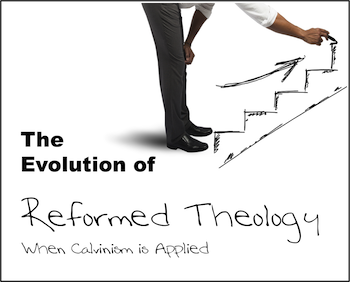The Evolution of Reformed Theology:
When Calvinism is Applied - Part 4

Let's look at another example of human wisdom and the Calvinistic denial of the scriptural harmony.
The following quote comes from Dr. R.C. Sproul, Jr.
"Children in the womb are not innocent. The Bible is abundantly clear on that principle, but History will suffice. Death is the result of sin. If babies die, we know they are not innocent. An innocent person only died once, and He volunteered for the job. The Scriptures are likewise clear that there is only one way for the guilty to be cleared: their sins must be covered by the blood of Christ. And there is only one way for that to happen: a person must trust in the finished work of Christ alone. If this is true, then our answer is abundantly clear. Those babies who trust in the finished work of Christ alone go to heaven when they die. Those babies who do not go to hell when they die." (Source: rcsprouljr.com)
My number one frustration with false teachers is their refusal to be guided by the harmony of Scripture. Please notice the following two passages. I ask you, are they contradictory or are they complementary?
Romans 3:10-12 (NKJV)As it is written:
“There is none righteous, no, not one;
There is none who understands;
There is none who seeks after God."
Acts 10:34-35 (NKJV)
"Then Peter opened his mouth and said: 'In truth I perceive that God shows no partiality. But in every nation whoever fears Him and works righteousness is accepted by Him.'"
Consider another example.
Psalms 51:5 (NKJV)
"Behold, I was brought forth in iniquity,
And in sin my mother conceived me."
Luke 18:16-17 (NKJV)
"But Jesus called them to Him and said, 'Let the little children come to Me, and do not forbid them; for of such is the kingdom of God. Assuredly, I say to you, whoever does not receive the kingdom of God as a little child will by no means enter it.'"
Do these passages contradict each other or do they, through the harmony of Scripture, actually complement each other? Are Romans 3:10-12 and Psalms 51:5 intended to prompt a literal interpretation or is it possible that, when seen as examples of rhetorical overstatement (hyperbole), they actually accentuate the Divine principles found in Acts 10:34-35 and Luke 18:16-17?
Hyperbole Is Used All the Time
It's important to note that hyperbole is actually a communicative tool that is used quite often in Scripture. Consider two times when Jesus Himself used rhetorical overstatement:
Luke 14:26 (NKJV)
"If anyone comes to Me and does not hate his father and mother ... he cannot be My disciple."
Matthew 7:3 (NKJV)
"And why do you look at the speck in your brother’s eye, but do not consider the plank in your own eye?"
Hate? Plank? Hyperbole!
Q: Did Paul intend to indict all of humanity with the words of Romans 3:12, "There is none who seeks after God." (NKJV)? Is there no possibility that anyone ever did seek God or ever would seek Him?
A: Certainly Noah sought after God and, as a result, was spared the results of the Flood. Abraham sought God and obtained at least enough understanding to enter into a covenant with God. In 2 Chronicles 17:4, the Holy Spirit says that Jehoshaphat sought after God and later the Holy Spirit even dates the year that Josiah “began to seek the God of his father David.” (2 Chronicles 34:3, NIV). Don’t forget the words of Jesus in John 7:17 (NIV), “Anyone who chooses to do the will of God will find out whether my teaching comes from God or whether I speak on my own.”
Yes, there have been many though out the ages who sought after God and found Him! How then can Romans 3:12 and Acts 10:34-35 coexist? The harmony of Scripture forces us to conclude that Romans 3:12 is using hyperbole to emphasize the general degradation of humanity much like Jesus used the example of a plank hanging out of a person's eye to emphasize the seriousness of hypocrisy.
And what about David's words in Psalms 51:5, "Behold, I was brought forth in iniquity, And in sin my mother conceived me." (NKJV)? Did He intend for us to conclude that babies are conceived as sinners and therefore born sinful infants? Or is it possible that He too was using rhetorical overstatement to expose the impact of sin on the entire human sphere and emphasize our lack of excuse? A very serious application: It is one thing to be born into a realm governed by Adam's nature (innocence removed), it is quite another to suggest that babies inherit Adam's guilty sentence!
When reformed theology bases its doctrine of original sin on rhetorical overstatement without filtering them through the rest of Scripture, they make a grave error. They willfully ignore the harmony of God's Word. In order to poke the proverbial beach ball with another one of man's opinions, they leap to extreme conclusions and assign babies to hell for their lack of faith. This is the sad result of Calvinism. This is the evolution of Reformed Theology.
Missed the first two parts of this study? Check it out!
The Evolution of Reformed Theology: "When Calvinism is Applied - Part 1"
"When Calvinism is Applied - Part 2"
"When Calvinism is Applied - Part 3"
Back to Top of "The Evolution of Reformed Theology: When Calvinism is Applied - Part 4"
Back to The Church Page
Back to Home Page


